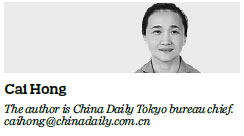Is Japan out to renege on its no-nuclear weapon policy?
Beatrice Fihn, executive director of the 2017 Nobel Peace Prize-winning International Campaign to Abolish Nuclear Weapons, was denied a meeting with Japanese Prime Minister Shinzo Abe during her recent visit to Japan. Visiting Hiroshima and Nagasaki, Fihn urged Japan, the only country to have suffered nuclear attacks, to play a leading role in the campaign aimed at abolishing nuclear weapons.
It is not difficult to understand why Abe shunned Fihn. She has appealed to the Japanese government to join the nuclear weapons ban treaty. But on Jan 17, Japan and the United States allowed their agreement on nuclear cooperation to automatically renew in July, when it is supposed to expire. The agreement, signed in 1988, gives Japan blanket approval to reprocess spent nuclear fuel for weapons-grade plutonium.

Japan adopted nuclear power in the 1950s (one of the first countries to do so) at the urging of the US. In fact, the US began engaging with Japan on nuclear energy soon after the end of World War II, as it was eager to promote and sell its nuclear reactor technology around the world.















